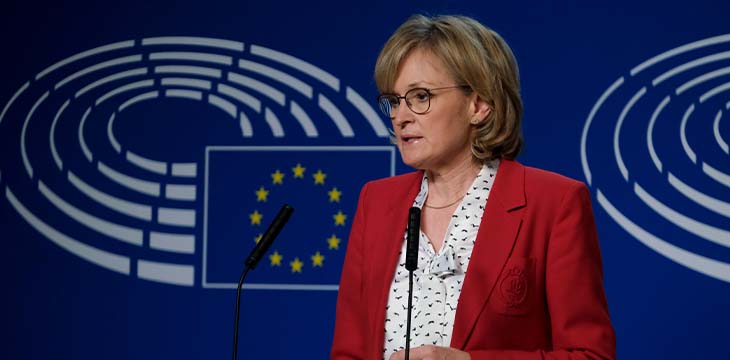|
Getting your Trinity Audio player ready...
|
Mairead McGuinness, the commissioner for financial services, financial stability, and capital markets union at the European Commission, has reiterated the European Union’s (EU) thoughts on the need for concerted efforts to go into regulations of the digital currency industry and market globally.
In an opinion piece published in the Hill, McGuiness shared that digital assets offer many opportunities for innovation but still pose a significant risk to global economies, especially if the right regulations are not implemented.
Cryptocurrency is going mainstream. To enable innovation in finance while effectively protecting consumers, we need a global approach to regulating crypto.
🗞 Read more in my op-ed for @TheHillOpinionhttps://t.co/UeBHKLW1zD
— Mairead McGuinness (@McGuinnessEU) May 2, 2022
Highlighting the benefits, McGuiness noted that the market’s underlying blockchain technology not only removes the need for centralized processes and intermediaries but it also makes transactions more transparent, cheaper, faster, and safer.
Conversely, the risks she said include the fact that a lot of investors may be harmed if the market is not regulated properly. Without regulations, investors could be unduly exposed to “fraud, deception or simply the volatility that has characterized crypto markets since their inception.”
Based on these thoughts, she called for global key players to collaborate on regulating the industry. For a start, McGuiness stated that the EU is open to working with the U.S. in leading regulators worldwide in this direction.
“I believe that the EU and the U.S. can together lead the way on a shared international approach to regulating crypto. Together, we can enable innovation in finance, while protecting consumers and maintaining financial stability,” she wrote.
The EU is already one of the first major jurisdictions to develop comprehensive regulations for digital currencies in the form of the Markets in Crypto-Assets (MiCA) proposal. By coordinating with the U.S. following the signing of an Executive Order by President Biden, much better results can be achieved, McGuiness remarked.
“We have no time to lose in managing this transformation for the benefit of investors, businesses and wider society,” she surmised.
The EU’s digital assets policy direction
Significantly, the risks of undue exposure to “fraud, deception, and volatility” that McGuiness highlights in her opinion aligns with the views shared by other members of the bloc who have likened most digital currencies to Ponzi schemes.
This concern has also marked the policy direction the EU has taken with the industry. Several of the provisions in the MiCA proposal are aimed at tightening the market. This is exemplified in the still controversial requirement for VASPs to collect and store transaction information of their customer that it recently approved.
Despite pushback and outcry from the industry, the commission has maintained that it sees the need for fast-tracking the regulations to also tighten sanctions on Russia, which it fears may use the market to evade sanctions, according to a Bloomberg report.
Watch: CoinGeek New York presentation, Integrating Business Apps with BSV Blockchain: Europe’s First Large-Scale Adoption

 03-04-2026
03-04-2026 




